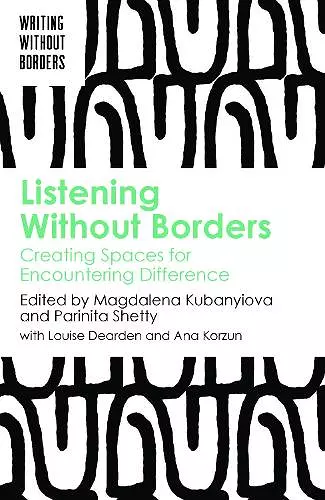Listening Without Borders
Creating Spaces for Encountering Difference
Magdalena Kubanyiova editor Parinita Shetty editor
Format:Paperback
Publisher:Multilingual Matters
Published:10th Sep '24
Should be back in stock very soon

An innovative text that disrupts academic norms of presentation and encourages conversation and participation
This book asks what it takes for people to encounter one another ethically when practices, worldviews and imaginations clash. It uses ‘listening’ as an encompassing metaphor for attending to others and engages over 40 contributors across geographies, disciplines, art forms and practices in a conversation which the reader is invited to join.
This book asks what it takes for people to encounter one another ethically when practices, worldviews and imaginations clash. It engages over 40 contributors across geographies, disciplines, art forms and practices in a conversation that touches on topics ranging from the climate catastrophe to the disintegration of the welfare state and the erasure of certain bodies from public spaces. It is concerned with how these ‘big’ questions play out in ‘small’ everyday encounters in classrooms, rehearsal rooms, arts projects, charity events or city markets. The book’s polyphonic text does not present answers to its central questions in the way a typical research publication might do. Instead, it creates a flow and invites the reader to join a conversation. By refusing to deliver an argument, the book opens new possibilities for relating to others in the academy and arts.
This book is open access under a CC BY ND licence.
Provocative and timely, this set of expansive interdisciplinary conversations engages with the unequal, unsettling, yet creative dimensions of listening in encounters across difference. It will resonate with all those within and outside the academy who seek a more profoundly ethical attunement to others. * Caroline Kerfoot, Stockholm University, Sweden *
Written in community across a broad range of contexts, disciplines and intellectuals, Listening Without Borders provides a rich, meditative tapestry on encounters through language(s) and arts. This book is beautifully curated, empathic and intellectually stimulating while inspiring necessary questions on broader issues of language and plurality. * Kamran Khan, University of Birmingham, UK *
This book reveals a diverse group engaged in a multilayered dialogue, upending our understanding as humans and scholars about how and why we interact with others. Their theoretical, practical and ethical interactions offer possibilities, not answers. They offer understandable and moving meditations on encountering others ethically and listening without ego. * Paula Golombek, University of Florida, USA *
Listening Without Borders is a ground-breaking book which offers a listening space and a space for ‘listening in’ and leaning in. I found myself gripped by the conversation and dialogue which emerged, by the space for a radical thought in place of a thoroughly referenced theory. I found this to be freeing, to be creating multiple edges, as in permaculture, allowing for a flourishing ecosystem of thought and listening. I found myself thinking hard with the gentle and generous thoughts in the book. I found myself relieved that there was no ‘conclusion’ and that the authors instead were both ‘staying with the trouble’ as Haraway puts it, ‘listening to the trouble’ and also refusing to clean it up or make it all tidy. This eschewing of what is often a violent epistemic move is especially refreshing. The insistence that arts can then be a positive way of enabling fresh ways of listening and learning to these interstices and possibilities for new avenues for thought, rather than closures, was fully congruent with the dialogue in the book.
The book is enticing, it does indeed attempt to listen without borders, to flow like a conversation and to bring conversation with all its excitement and at times alarming thrill, into the kind of academy we need to work within the poly-crises of the day. I’d recommend this book heartily to postgraduates in arts humanities and social sciences and especially those researching with arts and with languages.
* Alison Phipps, UNESCO Chair for Refugee Integration through Education, Languages and Arts, University of Glasgow, UK and author of "Decolonising Multiligualism: Struggles to Decreate" *Listening Without Borders is an engaging, ambitious and, in many ways, an unusual book that crosses conventions, countries, and perspectives. Part workbook, part qualitative research study, part call to action, [it] reminded me of a fabric quilt (like the one on page 17), patches full of color and textures that might hide a secret message in the threads. Listening without Borders is also a kind of love story—love of humanity, of creativity, of learning from a stranger, and especially, of that in-between space of difference, where the answer is not the goal. -- Shantih Clemans, SUNY Empire State University, USA, Adult Education Quarterly 2025
- Runner-up for BAAL Book Prize 2025
ISBN: 9781788921046
Dimensions: 234mm x 156mm x 10mm
Weight: 230g
142 pages